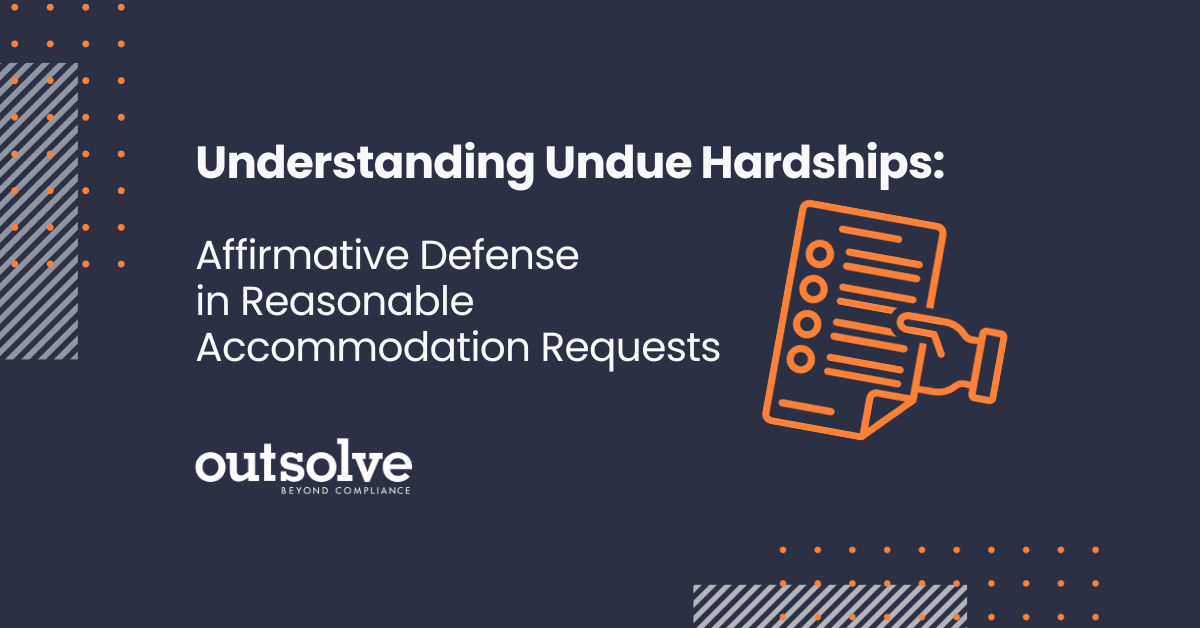3 min read
Understanding Undue Hardship: Affirmative Defense in Reasonable Accommodation Requests
 Toni Ahl
:
Oct 12, 2023 12:08:44 PM
Toni Ahl
:
Oct 12, 2023 12:08:44 PM

OutSolve’s EEO colleague, Toni Ahl, is an occasional contributor to our blog. The views, thoughts, and opinions expressed in this article belong solely to Toni and do not necessarily reflect the viewpoint of OutSolve or its employees.
Undue hardship is an affirmative defense that is available to employers under three statutes that are enforced by the Equal Employment Opportunity Commission (EEOC) when a reasonable accommodation is denied to an employee. Undue hardship is always determined on a case-by-case basis depending on the facts of the case as well as the situation of each employer.
In reasonable accommodation cases, an employee must notify their employer of the need for a reasonable accommodation unless the reason for the request is obvious. There are no “magic words” that employees need to use to request a reasonable accommodation, and the request may even be made by a third party such as a medical provider or family member. At the point a reasonable accommodation is requested, the employer is expected to enter into an interactive process with the employee to determine a reasonable accommodation that is effective. The employer does not have to provide the accommodation requested by the employee but does have to furnish an accommodation that is effective.
The three statutes that EEOC enforces which provide undue hardship as an affirmative defense are:
- The Americans with Disabilities Act of 1990, as amended (ADA)
- Title VII of the Civil Rights Act of 1964, as amended, (Title VII) under the basis of religion
- The Pregnant Workers Fairness Act (PWFA)
The analysis of undue hardship is the same for all three of these statues. The first factor to consider is the nature of the accommodation requested. This can be regarded as what an employee needs to perform their job duties. The accommodations will vary greatly depending on the facts and circumstances of each case. In ADA cases, an accommodation may be the need for a piece of assistive equipment or the need for an interpreter; whereas in a religious accommodation case, the request may be for a change of shift or a change to the dress code. In a case under the PWFA, the accommodation may be the temporary removal of an essential function of the employee’s job duties. The nature of accommodations is varied and therefore must be deliberated on an individualized basis.
The next factor to consider in the process is the net cost of the accommodation. Many accommodations do not have a cost but require some change to the way a certain function of the job is performed. Other accommodations, however, incur costs. What may be considered an undue hardship for an employer who has fifteen employees will be different for an employer who has thousands of employees. This aspect takes into account the financial resources that are available to the employer. An accommodation costing several thousand dollars could be disastrous for a very small employer but may be considered reasonable for a very large corporation. The last factor to consider is the overall effect of the reasonable accommodation on the general operation of the company. This will vary by the type of industry and what is being requested.
For years cases of religious accommodation were analyzed differently than cases under the ADA. In Title VII cases involving religious accommodations, the consideration hinged on whether providing the accommodation imposed a cost to the employer beyond a "de minimus" threshold. If there was, the employer was not required to provide the accommodation. In a decision issued on June 29, 2023 in the case of Groff v. DeJoy, the Supreme Court stated, in asserting an undue hardship defense, an employer which denies a reasonable accommodation must establish that accommodating the employee would result in “a burden that is substantial in the overall context of an employer’s business,” taking into account “all relevant factors in the case at hand, including the particular accommodations at issue and their practical impact in light of the nature, size, and operating cost of an employer.” The court also held that an accommodation’s effects on co-workers are relevant to the extent that they affect the conduct of an employer’s business.
Taking a step-by-step approach in mounting an affirmative defense of undue hardship under any of the statutes is the best way for any employer to effectively utilize this defense. There must be more information provided in defense of the charge other than the statement by the employer that the reasonable accommodation would constitute an undue hardship. If the employer uses the analysis provided, there is a much better chance of the defense being successful.
If you have questions about reasonable accommodation, the interactive process, or the undue hardship defense, feel free to reach out to Toni Ahl at eeoadvantage@gmail.com or (502) 553-7648.
President at EEO Advantage, LLC
Recent Posts

Countdown: Final Days of the 90-Day Safe Harbor Period for EO 11246
Related Posts

EEO-1 Reporting Requirements: A Complete Guide
EEO-1 Reporting Deadline 2024 Recently submitted documents to the Office of Management and Budget (OMB) indicate a proposed open data collection...

New Jersey Pay Transparency Laws: What You Need to Know
The topic of pay equity continues to gain attention across the United States, and New Jersey (NJ) is no exception. In fact, NJ is preparing to...

Why Companies and Institutions Should Fear False Claims Act Lawsuits When Signing Coming Federal Contract and Grant Certifications
OutSolve has invited John C. Fox, Esq. as a guest blogger providing legal insights on EEO and compliance issues. The views expressed in his posts are...

